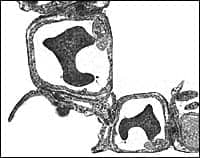An international team of researchers have shown that cigarette smoke reduces the activity of the immunoproteasome and impacts its levels in COPD patients.
The immunoproteasome is a defined structure in mammalian cells that is specialized to degrade protein molecules that are foreign to the cell, such as upon virus infection. Its function is comparable to a cellular shredder. Protein shreds (peptides) are then presented to the immune system on the outside of the cell to evoke a specific immune response against the virus-infected cell. A research team headed by PD Dr. Silke Meiners from the Institute of Lung Biology and Disease (iLBD) / Comprehensive Pneumology Center (CPC) at the Helmholtz Zentrum München has now discovered that smoking crucially impairs this protective response of the immune system.
“We observed that cigarette smoke reduces the activity of the immunoproteasome in human cells,” explains first author Ilona Kammerl. “As a result, the presentation of the degraded protein shreds to the immune system does not function properly and thus weakens the specific immune response.” Importantly, lungs of COPD patients displayed reduced immunoproteasome activity.
“COPD patients frequently experience acute worsening of pulmonary function (“exacerbations”) during a viral infection, and often do not completely recover from these. This suggests that the specific immune response to viral pathogens is reduced in COPD patients. Our data provide the first indications that this is due to cigarette smoke-induced reductions in immunoproteasome activity,” emphasizes study leader Silke Meiners. Cigarette smoke is a primary risk factor for COPD.








